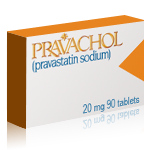Warnings & Recalls for Pravachol
In
February of 2012, the U.S. Food and Drug Administration approved
Pravachol label changes. These revisions warn patients about the following:
- risk of myopathy and rhabdomylosis (muscle loss or disease)
- liver failure or liver disease
- a need for regular liver enzyme tests while taking Pravachol
- interactions with colchicine, gemfibrozil, fibrates and niacin which can cause muscle damage or increased side effects
For safety,
let your doctor know about any of the following before taking
Pravachol:
- if you have a history of kidney or liver disease or failure, heart attacks, or strokes
- any allergies you may have, especially to statins
- any other medications you are taking or if you drink alcohol on a regular basis
- any surgeries or procedures you will be undergoing
- if you are pregnant, may become pregnant or are breastfeeding
Pravachol can decrease the ability of the liver function, especially if you drink alcohol while taking this medication. If you are taking Pravachol, have your liver examined and tested frequently.
Pravachol and Pregnancy
Pravachol has been assigned as a
pregnancy category X by the U.S. Food and Drug Administration. Prevachol can harm the fetus and
cause birth defects; Pravachol
should not be taken during pregnancy. Pravachol can be passed through
breast-milk to a nursing baby and is therefore considered
contraindicated in women who are
breastfeeding. If you are pregnant, planning to become pregnant, or are breastfeeding,
consult your doctor before taking Prevachol.
Pravachol Interactions
Avoid taking Niacin while being treated with Pravachol. Combining
Niacin and Pravachol can lead to serious muscle problems.
Side effects may include:
- muscle pain or achine
- loss of muscle strength
- myopathy (muscle disease) or rhabdomyolysis (breakdown of muscles)
Pravachol Treatment and Use
Pravachol | Pravastatin is an HMG CoA reductase inhibitor (statin) class medication marketed by Bristol-Myers Squibb for the promotion of healthy cholesterol levels in the body. Prevachol may be prescribed to patients with diabetes, heart disease or disorders to treat the following:
- lowering cholesterol
- reducing risk of heart attack or stroke
- decreasing possibility of heart disorders or disease
- decreasing high triglyceride levels
Pravachol should not be used by anyone under the age of 8.
How Does Pravachol Work?
Pravachol works by blocking the HMG-CoA reductase enzymes responsible for producing cholesterol. Pravachol decreases amounts of low-density lipoprotein (also known as “bad cholesterol”) and triglycerides in the body. High-density lipoprotein or “good cholesterol” levels may also be increased. Pravochol lowers cholesterol in blood, decreasing the risks of potential heart attacks or strokes.
Pravachol Dosage Information
Pravachol comes in tablet form and is typically taken once each day. For patients with high cholesterol, the normal dose is 40mg per day. Dosage and length of treatment varies in accordance with medical condition and age. Take Pravachol as prescribed and do not end treatment unless instructed to do so by your doctor.
If you have severe kidney or liver disease or are taking cyclosporine, your doctor may reduce your dosage of Pravachol.
No more than 80mg of Pravachol should be taken in 24 hours.

